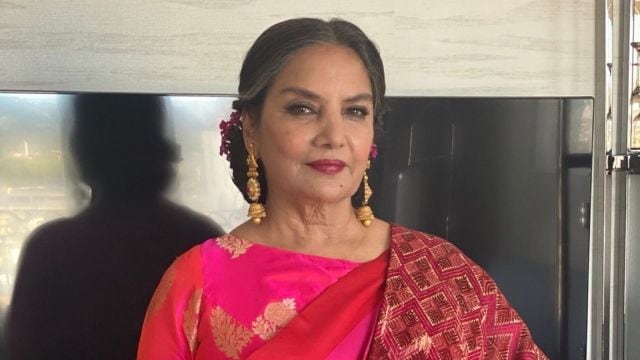📣 For more lifestyle news, click here to join our WhatsApp Channel and also follow us on Instagram
‘Koi samajh hi nahi ki matlab kya hai’: Shabana Azmi stresses the importance of understanding true meaning of feminism
“I was ironing Javed [Akhtar]'s kurta, and this woman said, ‘You call yourself a feminist and you are ironing your husband's kurta?’” Shabana Azmi said.
 Recalling an incident during a visit to the US, Shabana Azmi shared how a woman criticised her for ironing her husband Javed Akhtar’s kurta (Photo: Shabana Azmi/Instagram)
Recalling an incident during a visit to the US, Shabana Azmi shared how a woman criticised her for ironing her husband Javed Akhtar’s kurta (Photo: Shabana Azmi/Instagram)Veteran actor Shabana Azmi has long been a strong voice for social change, particularly around gender equality. In a recent conversation with journalist Faye D’Souza, she addressed a pressing issue: the misconceptions many hold about feminism today.
Azmi expressed frustration over young women distancing themselves from feminism due to a lack of understanding. “Itni chid aati hain na mujhe, kyuki koi samajh hi nahi hain ki feminist ka matlab kya hain (I get so frustrated because no one understands what being a feminist truly means). They are still associating with the bra-burning woman; they don’t know anything,” she remarked, stressing the importance of understanding feminism’s true essence.
Recalling an incident during a visit to the US, Azmi shared how a woman criticised her for ironing her husband Javed Akhtar’s kurta, questioning her feminist stance. “I was ironing Javed [Akhtar]’s kurta, and this woman said, ‘You call yourself a feminist, and you are ironing your husband’s kurta?’ When I said what has this got to do with feminism, she said, ‘Meaning? Will he iron your sari?’ I said, ‘I will never let him do that!’ Iski understanding bahot hi weak, kamzor hain. Kya matlab ki ‘I am not a feminist’? Have you even thought about it? There is no clarity.” To her, the incident reflected a weak understanding of feminism, which, she said, is about seeing the world through a unique perspective.
“The whole gaze in the way that you view the world is different. Men and women are different. Not better, not worse. That difference needs to be celebrated. Equal but different,” she stressed.
Why feminism is misunderstood and some common misconceptions
Sociologist Pranay Aggarwal, who also mentors IAS aspirants, tells indianexpress.com, “One of the most prevalent misconceptions is that feminism is anti-men — that feminists inherently dislike men. Another misconception is that feminism is extremely rigid or even extreme. Some people also view feminism as an attempt to replace male dominance with female dominance, as if feminists are trying to overthrow men from their so-called ‘rightful’ place in society.”
 Shabana Azmi’s idea of ‘equal but different’ aligns with feminist ideals broadening the concept of equality to encompass equity and fairness, not just sameness. (Source: Freepik)
Shabana Azmi’s idea of ‘equal but different’ aligns with feminist ideals broadening the concept of equality to encompass equity and fairness, not just sameness. (Source: Freepik)
A further misunderstanding is that feminism is only about women, he adds, as though it solely benefits women. This view misses the broader, nuanced idea that feminism challenges patriarchal structures that harm all genders, including men. Many people fail to see how men, too, can be victims of patriarchy and would benefit from the dismantling of these restrictive norms.
Aggarwal continues, “In India, there’s a widespread belief that feminism is a ‘Western import,’ a concept limited to certain elite, Westernised circles, like university campuses or metropolitan areas. This framing can obscure the deeply rooted and diverse expressions of feminism within Indian culture, making feminism seem elitist or inaccessible to the broader society.”
Another reason feminism is misunderstood could be the way it’s portrayed on social media, where caricatured, stereotypical depictions often overshadow more meaningful feminist conversations, states Aggarwal.
How can individuals develop a more nuanced understanding of feminism that goes beyond stereotypes
“A nuanced understanding of feminism requires exposure to its rich literature and history,” notes Aggarwal. Schools and colleges could play a crucial role by incorporating fundamental feminist ideas into the general curriculum. Beyond formal education, film and media can also offer powerful insights, but these messages shouldn’t be reduced to “soundbites” that trivialise complex issues, he says.
“Moving beyond stereotypes requires a deeper engagement with feminism’s core values. Intersectional feminism, for instance, emphasises the interconnected nature of social identities, like race, class, and gender, which shapes individuals’ experiences and challenges,” says Abdul Nasir Shaikh, founder and CEO, Total Coaching and Mentoring Collectve LLP.
This perspective reveals feminism’s multi-faceted approach to addressing inequality, Shaikh adds, showing it as a framework that advocates for diverse, inclusive solutions. “By reading feminist literature, engaging in open discussions, and listening to varied voices within the movement, individuals can begin to see feminism as a powerful force for societal transformation.”
📣 For more lifestyle news, click here to join our WhatsApp Channel and also follow us on Instagram





- 01
- 02
- 03
- 04
- 05






















